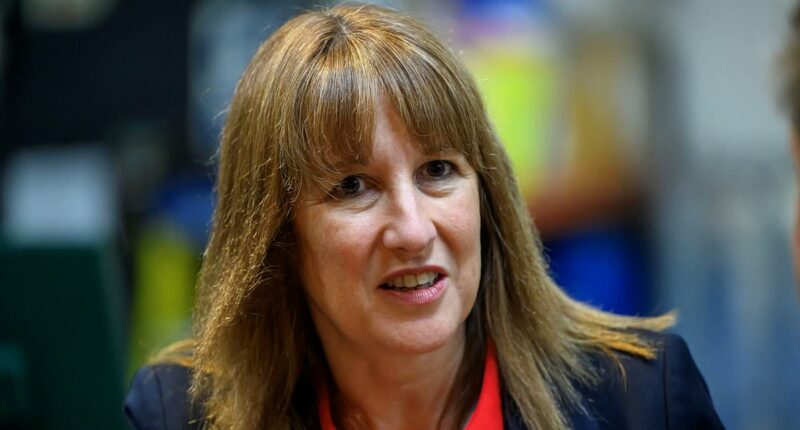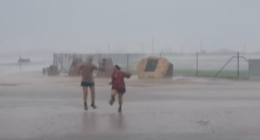Share this @internewscast.com
Britain’s economy faced a grim quadruple whammy on Tuesday, piling pressure on Rachel Reeves just weeks from the Budget.
The International Monetary Fund (IMF) has issued a sobering report stating that inflation in the UK will surpass that of any other developed economy this year. Additionally, Britain is predicted to experience the most significant decline in living standards in the Western world.
Adding to the bleak situation, official figures showed unemployment at a four-year high while at the same time wage growth has slowed sharply.
As the economic outlook worsened on Tuesday night, a senior official from the Bank of England cautioned that the UK could be headed for a ‘hard landing,’ with an increasing likelihood of a recession.
This recent update reflects poorly on Labour’s economic performance, preceding a Budget next month that is anticipated to lead to more severe tax increases. The Chancellor aims to address a deficit in public finances that might reach up to £30 billion.
Despite these negative prospects, Ms. Reeves is expected to present an optimistic perspective as she attends the IMF’s annual gatherings in Washington, asserting that the UK is a ‘pillar of stability and growth.’
But the Tories said the IMF’s assessment of the UK economy made for ‘grim reading’.
The IMF projects that inflation will reach 3.4 per cent this year and drop to 2.5 per cent by 2026, figures higher than those anticipated for other G7 countries, including the US, Germany, France, Italy, Canada, and Japan.

Rachel Reeves has traveled to Washington for the IMF’s annual meetings, where she is planning a Budget next month that is likely to bring about further challenging tax increases.
IMF chief economist Pierre-Olivier Gourinchas said inflation in Britain appeared to be ‘moving in the wrong direction’.
And though he said that could be temporary, the cost of living squeeze may yet persist – partly due to the higher costs of employing workers. These have risen partly as a result of Labour’s employer national insurance hike.
At the same households and businesses are ‘becoming a little less certain that inflation will be coming down quickly’, Mr Gourinchas said.
As a result, the Bank of England should be ‘very cautious’ about cutting interest rates, he added – a prospect that will spell misery for millions of borrowers.
And in a further blow to Ms Reeves, the IMF indicated that Labour is failing in its pledge to deliver the fastest growth among the G7.
It now expects the UK economy to grow by 1.3 per cent this year and next – leaving it behind Donald Trump’s America in 2025 and both the US and Canada in 2026.
And a further breakdown of the figures showed that, stripping out the impact of population increases, Britain will be at the bottom of the pile next year – with growth per head of just 0.5 per cent, the lowest in the G7.
The figures – seen as a measure of living standards – showed that ‘too much of its future growth’ still relies on population growth, according to Barret Kupelian, chief economist at PwC UK.

The UK economy is set to be behind Donald Trump’s America in 2025 and both the US and Canada in 2026
Lindsay James, investment strategist at wealth management firm Quilter, said the IMF’s report should be a ‘shot across the bows’ for Ms Reeves.
‘The next Budget must not push yet more costs onto businesses at a time when inflation risks becoming more embedded; it ultimately ends up being shouldered largely by consumers, the very “working people” she has said she wants to protect,’ Ms James said.
Shadow Chancellor Sir Mel Stride said: ‘The IMF assessment makes for grim reading. Inflation in the UK is now set to be the highest in the G7 this year and next – rising faster than expected because of the choices Rachel Reeves has made.
‘Since taking office, Labour have allowed the cost of living to rise, debt to balloon, and business confidence to collapse to record lows. Taxes are rising to record highs and families are being squeezed from all sides.’
The IMF report came as the Office for National Statistics (ONS) revealed a rise in unemployment to 4.8 per cent, the highest since 2021.
It said the rise was ‘driven mostly by younger people’ – with joblessness among 25-34 year olds at the highest rate since 2020, partly driven by firms not hiring due to Ms Reeves’s National Insurance hike for employers.
Meanwhile, a record number of over-65s – more than 1.7 million – are now in work, according to the figures covering the three months to August.
The ONS figures also showed that wage growth has slowed to 4.7 per cent, the weakest since 2022.

Shadow Chancellor Sir Mel Stride said the IMF assessment makes for ‘grim reading’
For the private sector it was even worse, with pay increases slowing to a near four-year low of 4.4 per cent.
In contrast, bumper pay settlements for the public sector saw their salaries go up by 6 per cent, the strongest for more than a year.
On Tuesday, Bank of England rate-setter Alan Taylor warned in a speech that the ‘risk is rising’ that the UK will face a ‘hard landing… where recession dynamics kick in that can be very difficult to contain or even reverse’.
Mr Taylor added: ‘The economy has been flirting with zero growth, and the realisation of negative readings could easily change the future path for the worse. The probability of this outcome is now not trivial.’
Ms Reeves will claim on Wednesday that Labour is ‘delivering national renewal built on the rock of economic stability’.
But on Tuesday, around the Cabinet table, she admitted that inflation remains ‘too high’ – and warned ministers that growth and productivity continued to come in lower than expected, increasing the pressure on the public finances.
Downing Street said the Chancellor told the Cabinet that the cost of living ‘remains the biggest challenge’.
A spokesman added: ‘She said inflation is too high and the government would bear down on inflation, control public spending, and prioritise growth.
‘She said the challenge was the fact that growth and productivity figures over the past 15 years have kept coming in lower than expected, and borrowing costs and debt levels are too high, leaving less revenue available for public services, and demonstrating why getting debt down and growth up was so important.’









